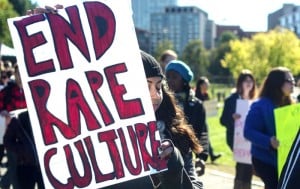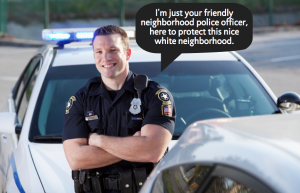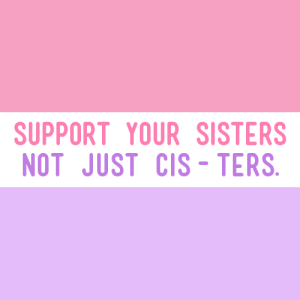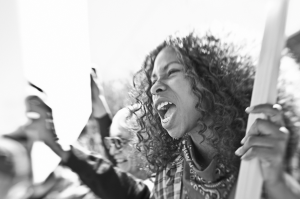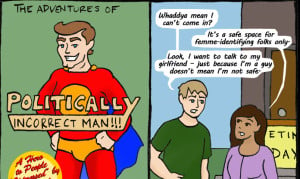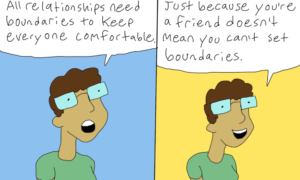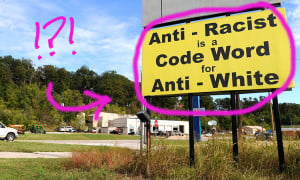
HuffPo
I’m just going to say it now: If a white person feels attacked by the basic premise of anti-racism, that person might be racist. And no, I don’t hate white people.
I also know that for saying this, some reading this article will make the assumption that I want nothing more than to make white people feel guilty for doing unspeakable things to my ancestors.
But this is a misunderstanding.
Not because unspeakable things weren’t done to my ancestors (possibly), but because that’s actually not the point of talking about racism in the modern age.
The point is that what happened 40, 50, and 100 years ago is still influencing race relations and politics in the here and now, things that people alive today can reflect on and change.
White people have historically possessed a disproportionate amount of power, resources, and political authority in the Global North. This isn’t to say that no other race of people has ever had the itch to conquer and enslave, but rather, that white people were pretty successful at doing so in a lot of places fairly recently. This is in part due to the actions of dead people, but it’s also perpetuated by those who refuse to acknowledge that this history exists.
The slogan “Anti-Racist Is a Code Word for Anti-White” — which has appeared on billboards, Facebook pages, and websites about white genocide — is an example of this. It’s more or less claiming that the movement to end racial discrimination is actually a ploy to attack and diminish white people.
The problem with the slogan is that anti-racists aren’t generally interested in destroying the white race. And if there are some anti-racists who really are fighting for the genocide of white people, they’re doing anti-racism wrong. They also won’t get very far because white people currently have the political power to put a stop to all of that pretty quickly.
The supposed connection between anti-racism and being anti-white is a misunderstanding of what racial equality looks like. In order to fight racial inequality, the people who have the most racial privilege in society — white people at the moment — must lose some of their power.
And it’s inevitable that people will feel threatened when slivers of their power are taken away even if power is more evenly distributed as a result. It’s like a kid asking her brother to split a pie evenly when he’s been serving himself two-thirds of it his whole life.
The new arrangement sounds fair and equal, but damn it, he’d be getting a lot less pie, and he likes his pie. Of course he doesn’t want to stop serving himself two-thirds of it. Who would?
That’s what it’s like to benefit from the oppression of other people: Few of us want to give up the privileges that elevate us above others in society (because it makes our lives easier), even if doing so would make things more equal for all.
Being born white in a country with a white political majority is a privilege. It’s certainly not the only form of privilege, but it is a pretty big one. And anti-racists want to dismantle it. Cue white people calling anti-racists the real racists.
The “Anti-Racism Is Code for Anti-White” sloganeers confuse being against white privilege with being against white people as human beings. Humanity in general, white people included, would benefit from a lack of all racial privilege. To clarify, here are three things anti-racism is actually against:
1. Anti-Racism Is Anti-Discrimination
Don’t let the lack of a “white’s only” water fountain at your local amusement park fool you — racial discrimination is alive and well.
In ways both subtle and obvious, racial discrimination affects the justice system, the school system, the prison system, voting, housing, districting – in short, everything.
Anti-racism work is made necessary by racial discrimination.
However, a lot of people either believe that racial discrimination is no longer an issue or that it goes both ways — as in, white people are just as likely as people of color to experience racial discrimination.
White people can experience discrimination and prejudice from people of color. I’ve seen it happen, and I’m not going to pretend it doesn’t suck. But it isn’t the same as systemic racism, which is something people of color deal with in some form or another for their entire lives.
Systemic racism isn’t just a disparaging remark or an unwelcoming neighborhood. It’s an entire system of oppression that unfairly privileges people based on their race.
In the United States of America, for example, whiteness is privileged. The area we now call the United States of America was colonized by white people.
The government they formed initially afforded rights and property to white men and no one else despite there being nations of people living on the land they claimed. The government also legally upheld segregation well into the 20th century. To say that whiteness is not privileged in the US when most of its power and wealth has been deliberately and systematically placed in white hands is wishful thinking at best.
It’s also ignorant of the experience of people of color to claim that things like affirmative action or being snubbed at a barber shop are the equivalent of systemic racism of the kind that got Mike Brown put on trial for his own death by way of the media.
2. Anti-Racism Is Anti-Privilege
Anti-racists know that not all people with privilege are evil and incapable of being oppressed. In fact, people with white privilege can also be oppressed as women, LGBTQIA+ people, disabled people, and more. But none of these negate their white privilege.
When being white comes with privilege, it means that not being white comes with disadvantages. This is what anti-racists take issue with — not white people as individuals.
That isn’t to say that white people should feel guilty for having white privilege. All white guilt is self-serving because it’s never actually benefited people of color, and people of color don’t want or care about it.
Hell, white people should enjoy their privilege because they can do so much with it. They can say things people of color have been saying for ages and get praised for it.
They can expose white privilege like Louis CK does in his bit about time machines without being accused of reverse racism. They can do work to counteract racism and white privilege while still having white privilege.
They can even prevent racism by making the conscious decision to not be racist. Anti-racists don’t want white people to feel guilty for that. Anti-racists want white people to own up to their privilege and do something with it or about it.
3. Anti-Racism Is Anti-Racism
So now for the most obvious point: Anti-racism is against racism. It’s not against a particular race.
It’s not against white people as individuals. It is against a system of oppression, not a group of people.
However, the racist system of oppression in place in white-dominant nations was created by white people for white people, which means that even perfectly nice white people with no hateful bones in their bodies benefit from racism.
White people who marry black people and have black babies benefit from racism. All white people who don’t actively ally themselves with people of color benefit from racism because society was deliberately set up to give them an advantage.
And so when anti-racists work to counteract racism, they’re also working to make these privileges – which are currently given to those born white – available to all people regardless of their race. And I’d imagine that for white people who don’t recognize that these advantages aren’t universal or a result of their hard work and determination, this might seem unfair.
But to say that working against racism is an attempt to destroy white people as a race is a leap too far. White people shouldn’t be subjected to racial discrimination, genocide, or marginalization, but we need to finish dealing with the way these things are still affecting people of color.
The day that white people become the main targets of racial oppression is the day that anti-racism work will be mainly for their benefit.
***
So no, anti-racism is not anti-white and shouldn’t be.
Anti-racists want white people to understand and be engaged in their work as allies. In fact, white people who actually work to dismantle systems of privilege and discrimination are welcome to talk to all of their friends about it so people of color don’t have to bear the burden of ending their own oppression.
And if you’re the kind of person who feels threatened by ending discrimination, acknowledging and dismantling privilege, and supporting racial equality, anti-racism isn’t against you because you’re white. Anti-racism is against you because you’re racist.
[do_widget id=”text-101″]
Jarune Uwujaren is a Contributing Writer for Everyday Feminism. A Nigerian-American recent graduate who’s stumbling towards a career in writing, Jarune can currently be found drifting around the DC metro area with a phone or a laptop nearby. When not writing for fun or profit, Jarune enjoys food, fresh air, good books, drawing, poetry, and sci-fi. Read their articles here.
Search our 3000+ articles!
Read our articles about:
Our online racial justice training
Used by hundreds of universities, non-profits, and businesses.
Click to learn more






